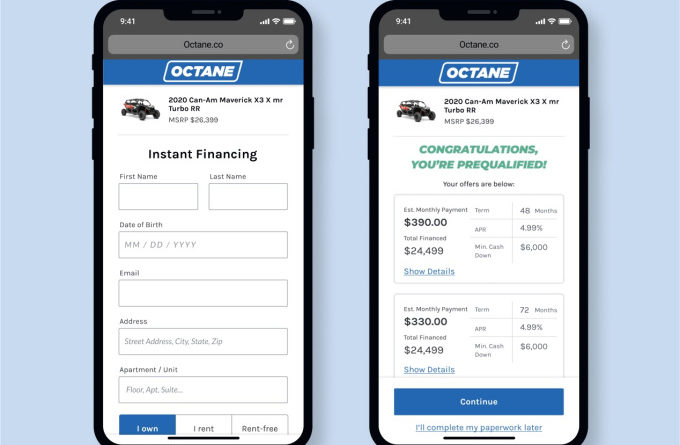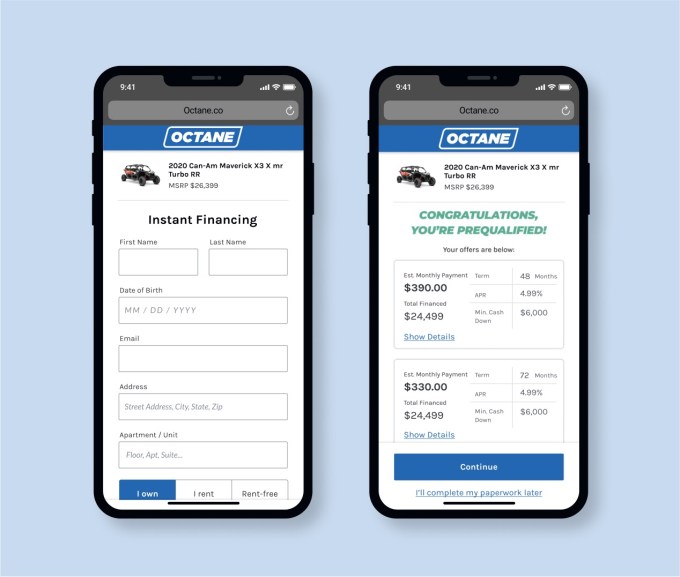
Most of the time when people get loans, it’s for big life purchases such as a house or a car.
But not every big purchase is a necessity. Some are more for fun, and the financing options for those types of buys — such as motorcycles and ATVs — are more limited. Today, Octane Lending, a company that embarked seven years ago on remedying that, announced it has raised $52 million in a Series D round of funding that values the company at over $900 million.
The company, which offers “instant” financing for large recreational purchases, boasts impressive financials in a startup world whose inhabitants are mostly unprofitable. For one, Octane is both net income and operating cash flow positive, and expects to originate more than $1 billion in the next 12 months. It has been doubling revenue annually, and CEO and co-founder Jason Guss projects that the company will see “over $100 million in revenue” this year. Its valuation is now “more than double” what it was at the time of its July 2020 $25 million raise, according to Guss.
Progressive Investment Company Inc., a member of the Progressive Insurance group, led its latest financing, which included participation from existing backers Valar Ventures, Upper90, Contour Venture Partners, Citi Ventures, Third Prime and Parkwood, as well as new investors Gaingels and ALIVE.
With the latest round, New York-based Octane has now raised more than $192 million in total equity funding since its 2014 inception.
Octane launched with the goal of “making lending better in overlooked markets,” according to Guss. Specifically, Octane initially set out to build a lender marketplace to streamline retail financing in the powersports category. Put more simply, it wanted to help people who want to buy things like motorcycles, snowmobiles, jet skis and ATVs get the financing they need to do so.
“We quickly learned that the buying journey in powersports markets was broken beyond just financing,” Guss told TechCrunch. “We elevated our goal to build an end-to-end buying solution including editorial content, consumer pre-qualification tools, instant full-spectrum financing and digital deal closing.”

Image Credits: Octane
Because lending is involved in about 80% of powersports purchases and about 80% of lending happens in the dealership, Octane focused first on building a lending platform for dealerships and consumers. Then in 2016, it launched Roadrunner Financial, a wholly owned-and-operated lender, so that it could offer full spectrum lending, “expand access to credit and speed up transactions through digitization and automation.” Today, the company is partnered with 3,800 dealers.
With an anchor in dealerships, Octane then expanded its scope. Last year, it acquired Cycle World and UTV Driver, along with five other brands from Bonnier with a goal “to inspire and inform powersports enthusiasts across the nation.” Also last year, it launched Octane Pre-qual, which enables consumers to instantly prequalify for financing on OEM and dealership websites with a soft credit pull. With that offering, Octane aims to help direct consumers to a dealership, close their loan and complete their purchase in one place.
“We are growing dramatically because we make transactions faster and simpler to close for consumers and dealerships,” Guss said. “We are the only platform to offer end-to-end purchasing benefits in the markets we play in.”
Looking ahead, Octane plans to use its new capital to expand to adjacent “other passion purchase” markets and continue to launch customer engagement tools as well as buying solutions for consumers shopping for powersports vehicles online. It also wants to continue to add dealership, OEM and brand partners, which today include BRP, Suzuki and Triumph Motorcycles.
“We define a passion purchase as a major discretionary purchase that brings people joy,” Guss said. “Most innovation and investment is focused on large, marquee markets such as small business, auto and homes.” As people spent less toward travel and eating out once the COVID-19 pandemic hit, the powersports market got a boost, growing double digits last year, noted Guss.
“Our core customer base was not significantly impacted by COVID economically so consumer demand and loan performance remained strong,” he said.
Andrew Quigg, chief strategy officer at Progressive Insurance, believes that technology and consumers’ needs continue to evolve.
“Octane’s point-of-sale loan origination platform provides benefits to consumers and dealerships in a specialty segment of the lending market,” he said. “We like to partner with innovative, forward-thinking companies and believe that our investment in Octane aligns very well with this strategy.”
Octane describes itself as a remote-first workplace that has offices in New York and Dallas. It has grown its team by 50% in the last year, from 213 to 336 employees.



